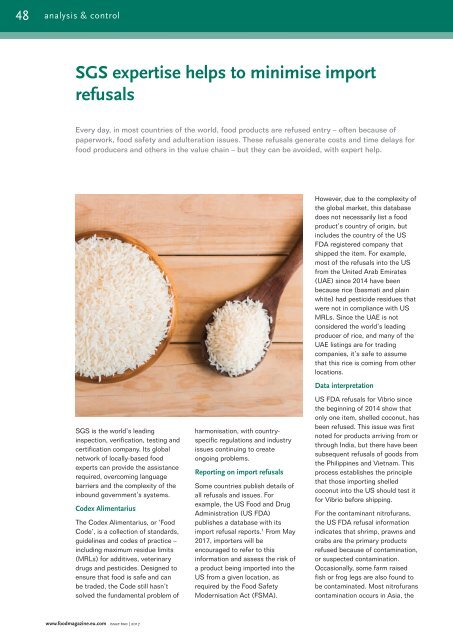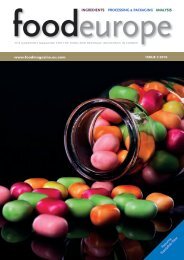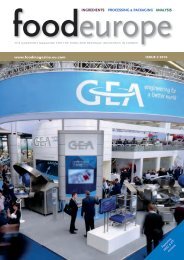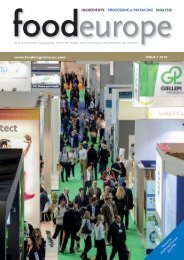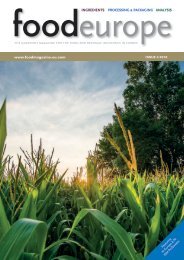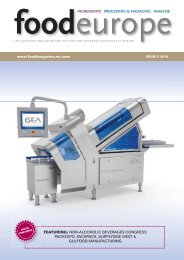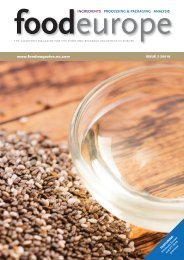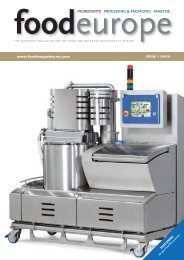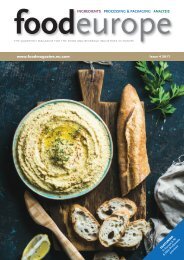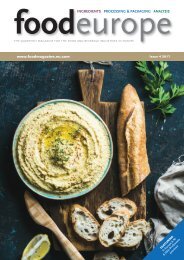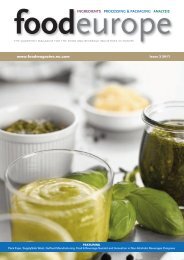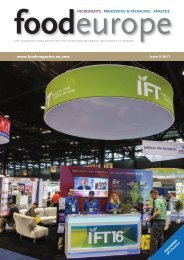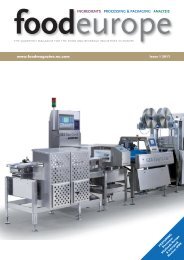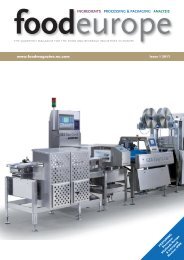issue_2_2017
Create successful ePaper yourself
Turn your PDF publications into a flip-book with our unique Google optimized e-Paper software.
48<br />
analysis & control<br />
SGS expertise helps to minimise import<br />
refusals<br />
Every day, in most countries of the world, food products are refused entry – often because of<br />
paperwork, food safety and adulteration <strong>issue</strong>s. These refusals generate costs and time delays for<br />
food producers and others in the value chain – but they can be avoided, with expert help.<br />
SGS is the world’s leading<br />
inspection, verification, testing and<br />
certification company. Its global<br />
network of locally-based food<br />
experts can provide the assistance<br />
required, overcoming language<br />
barriers and the complexity of the<br />
inbound government’s systems.<br />
Codex Alimentarius<br />
The Codex Alimentarius, or ‘Food<br />
Code’, is a collection of standards,<br />
guidelines and codes of practice –<br />
including maximum residue limits<br />
(MRLs) for additives, veterinary<br />
drugs and pesticides. Designed to<br />
ensure that food is safe and can<br />
be traded, the Code still hasn’t<br />
solved the fundamental problem of<br />
harmonisation, with countryspecific<br />
regulations and industry<br />
<strong>issue</strong>s continuing to create<br />
ongoing problems.<br />
Reporting on import refusals<br />
Some countries publish details of<br />
all refusals and <strong>issue</strong>s. For<br />
example, the US Food and Drug<br />
Administration (US FDA)<br />
publishes a database with its<br />
import refusal reports. 1 From May<br />
<strong>2017</strong>, importers will be<br />
encouraged to refer to this<br />
information and assess the risk of<br />
a product being imported into the<br />
US from a given location, as<br />
required by the Food Safety<br />
Modernisation Act (FSMA).<br />
However, due to the complexity of<br />
the global market, this database<br />
does not necessarily list a food<br />
product’s country of origin, but<br />
includes the country of the US<br />
FDA registered company that<br />
shipped the item. For example,<br />
most of the refusals into the US<br />
from the United Arab Emirates<br />
(UAE) since 2014 have been<br />
because rice (basmati and plain<br />
white) had pesticide residues that<br />
were not in compliance with US<br />
MRLs. Since the UAE is not<br />
considered the world’s leading<br />
producer of rice, and many of the<br />
UAE listings are for trading<br />
companies, it’s safe to assume<br />
that this rice is coming from other<br />
locations.<br />
Data interpretation<br />
US FDA refusals for Vibrio since<br />
the beginning of 2014 show that<br />
only one item, shelled coconut, has<br />
been refused. This <strong>issue</strong> was first<br />
noted for products arriving from or<br />
through India, but there have been<br />
subsequent refusals of goods from<br />
the Philippines and Vietnam. This<br />
process establishes the principle<br />
that those importing shelled<br />
coconut into the US should test it<br />
for Vibrio before shipping.<br />
For the contaminant nitrofurans,<br />
the US FDA refusal information<br />
indicates that shrimp, prawns and<br />
crabs are the primary products<br />
refused because of contamination,<br />
or suspected contamination.<br />
Occasionally, some farm raised<br />
fish or frog legs are also found to<br />
be contaminated. Most nitrofurans<br />
contamination occurs in Asia, the<br />
www.foodmagazine.eu.com <strong>issue</strong> two | <strong>2017</strong>


